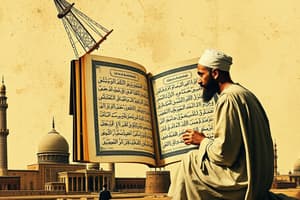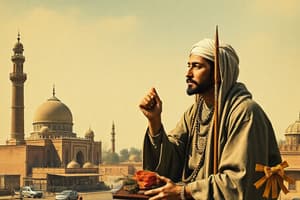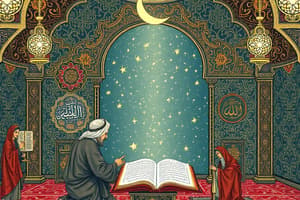Podcast
Questions and Answers
Flashcards are hidden until you start studying
Study Notes
Islamic History
-
Origins of Islam
- Founded in the 7th century CE in Mecca, present-day Saudi Arabia.
- Prophet Muhammad is regarded as the final prophet of Islam.
- Key event: The Night of Ascension (Isra and Mi'raj) where Muhammad received revelations from Allah.
-
Key Texts
- The Quran: The holy book of Islam believed to be the word of God as revealed to Muhammad.
- Hadith: Collections of sayings and actions of Muhammad that provide guidance.
-
Spread of Islam
- Rapid expansion in the 7th and 8th centuries through trade, conquest, and missionary activities.
- The establishment of the Caliphate system, starting with the Rashidun Caliphate (632-661 CE).
-
Major Caliphates
- Rashidun Caliphate: First four caliphs, known for their close ties to Muhammad.
- Umayyad Caliphate (661-750 CE): Expanded the empire greatly, covering parts of Europe, Asia, and Africa.
- Abbasid Caliphate (750-1258 CE): Known for cultural and scientific flourishing in cities like Baghdad.
-
Cultural Contributions
- Advancements in mathematics, astronomy, medicine, and philosophy during the Islamic Golden Age (8th-14th centuries).
- Development of art, architecture (e.g., mosques), and literature.
-
Geopolitical Influence
- Rise and fall of various empires: Ottoman Empire (1299-1922), Safavid Empire (1501-1736), Mughal Empire (1526-1857).
- Interaction with European powers, particularly during the Crusades and later colonial periods.
-
Modern Era
- Impact of colonialism in the 19th and 20th centuries.
- Emergence of nation-states in the Muslim world post World War I.
- Ongoing socio-political changes, including the rise of political Islam and various movements.
-
Key Issues
- Sectarian divisions: Sunni and Shia branches with historical and theological differences.
- Contemporary challenges: Extremism, globalization, and the search for identity.
Origins of Islam
- Founded in the 7th century CE in Mecca, located in present-day Saudi Arabia.
- Muhammad, the last prophet of Islam, received divine revelations, marking significant spiritual milestones.
- The Night of Ascension (Isra and Mi'raj) is a pivotal moment when Muhammad was granted divine insights.
Key Texts
- The Quran is considered the holy book of Islam, believed to contain the exact words of God as revealed to Muhammad.
- Hadith refers to collections documenting Muhammad's sayings and actions, serving as essential guidance for Muslims.
Spread of Islam
- Rapid expansion took place in the 7th and 8th centuries, facilitated by trade, military conquests, and missionary efforts.
- The Caliphate system emerged, beginning with the Rashidun Caliphate, which lasted from 632 to 661 CE.
Major Caliphates
- Rashidun Caliphate comprised the first four caliphs; they were closely connected to Muhammad and helped consolidate Islam.
- The Umayyad Caliphate (661-750 CE) significantly expanded territorial reach across Europe, Asia, and Africa.
- The Abbasid Caliphate (750-1258 CE) is noted for its cultural and scientific achievements especially within the intellectual hub of Baghdad.
Cultural Contributions
- The Islamic Golden Age (8th-14th centuries) saw significant advancements in mathematics, astronomy, medicine, and philosophy.
- Notable growth in art, architecture (including grand mosques), and literature during this period.
Geopolitical Influence
- The rise and fall of major empires such as the Ottoman Empire (1299-1922), Safavid Empire (1501-1736), and Mughal Empire (1526-1857).
- Interaction with European powers was marked by conflicts including the Crusades and shifts during the colonial era.
Modern Era
- The 19th and 20th centuries were shaped by the impacts of colonialism on Muslim societies.
- Post World War I saw the creation of nation-states in the Muslim world, altering traditional structures.
- Continued socio-political transformations are evident, emphasizing the rise of political Islam and varied movements.
Key Issues
- Sectarian divisions persist, primarily between Sunni and Shia branches, highlighting historical and theological disparities.
- Contemporary challenges involve addressing extremism, navigating globalization, and seeking Muslim identities in modern contexts.
Ecology Overview
- Ecology is the study of interactions between organisms and their environments, encompassing various organizational levels.
- Levels of organization include Individual (single organism), Population (same species in an area), Community (multiple populations), Ecosystem (community plus environment), Biome (large area defined by climate and life forms), and Biosphere (global sum of all ecosystems).
Key Concepts in Ecology
- Habitat refers to the natural environment where an organism resides.
- Niche is the specific role or function of an organism within its habitat.
- Trophic levels outline the flow of energy:
- Producers (autotrophs like plants),
- Primary Consumers (herbivores),
- Secondary Consumers (carnivores that eat herbivores),
- Tertiary Consumers (carnivores that eat other carnivores),
- Decomposers (organisms like bacteria and fungi that recycle dead matter).
Energy Flow and Nutrient Cycling
- Food chains represent a linear sequence of energy transfer among organisms.
- Food webs consist of interconnected food chains, illustrating complex feeding relationships.
- The energy pyramid demonstrates energy loss (approximately 90%) at each trophic level, with only about 10% of energy passed to the next level.
- Biogeochemical cycles include:
- Carbon Cycle: Carbon movement through different spheres (atmosphere, biosphere, geosphere, hydrosphere),
- Nitrogen Cycle: Transformation of nitrogen into various forms,
- Water Cycle: Continuous movement of water via evaporation, condensation, and precipitation.
Population Ecology
- Population dynamics involves the study of changes in population size over time.
- Key factors influencing population include:
- Birth Rate: Number of births in a given period,
- Death Rate: Number of deaths in the same period,
- Immigration: Influx of new individuals,
- Emigration: Outflow of individuals from a population.
- Carrying capacity is the maximum population size an environment can sustain indefinitely.
Community Ecology
- Species interactions encompass:
- Competition for shared resources,
- Predation where one organism feeds on another,
- Mutualism where both species benefit,
- Commensalism benefiting one while leaving the other unaffected,
- Parasitism where one organism benefits at the expense of another.
Ecosystem Ecology
- Ecosystem services are essential benefits provided by ecosystems, such as pollination and water purification.
- Succession is the process of change in species composition within an ecosystem:
- Primary Succession occurs in previously lifeless areas (e.g., after volcanic eruptions),
- Secondary Succession refers to recovery following disturbances (e.g., after forest fires).
Conservation Biology
- Biodiversity signifies the variety of life within a specific environment or ecosystem.
- Major threats to biodiversity include habitat destruction, climate change, pollution, and invasive species.
- Conservation strategies aimed at preserving biodiversity include establishing protected areas, promoting sustainable practices, and engaging in restoration ecology efforts.
Human Impact on Ecology
- Urbanization leads to habitat loss and fragmentation, posing threats to local ecosystems.
- Pollution contaminates air, water, and soil, adversely affecting wildlife and human health.
- Climate change results in altered ecosystems due to global warming effects like shifting climates and species distributions.
- Overexploitation involves the unsustainable harvesting of natural resources which jeopardizes ecosystem balance.
Studying That Suits You
Use AI to generate personalized quizzes and flashcards to suit your learning preferences.




